ASTM D3919 Selenium Test in Runoff Water
The ASTM D3919 standard practice addresses the determination of selenium in water samples, including runoff from agricultural activities. Selenium is a trace element critical to human and animal health but can be toxic at high concentrations. In agricultural runoff, selenium accumulates due to its use as a fungicide or soil amendment. Accurate measurement ensures compliance with environmental regulations and protects public health.
The test method involves several steps: sample collection, digestion, and final analysis using atomic absorption spectrophotometry (AAS) or inductively coupled plasma mass spectrometry (ICP-MS). The precision of the results depends on proper sample handling to avoid contamination. This service is essential for compliance with local, state, and federal regulations, such as those outlined in ASTM D3919.
Our laboratory adheres strictly to ASTM standards to ensure accurate and reliable results. We provide detailed reports that include a comprehensive analysis of selenium levels in runoff water, along with recommendations for mitigating excess concentrations.
- Customer Impact: By ensuring compliance with environmental regulations, our service helps prevent costly fines and legal issues.
- Sustainability: Reducing selenium contamination supports ecosystem health and biodiversity.
- R&D Insights: Identifying selenium sources aids in optimizing agricultural practices for sustainability.
- Compliance: Reliable test results support long-term compliance with environmental standards.
The ASTM D3919 method is particularly useful in areas prone to agricultural runoff, such as coastal zones and freshwater bodies. Accurate selenium testing is critical for understanding the impact of agricultural practices on water quality and for implementing effective mitigation strategies.
Our laboratory has extensive experience in this area, offering not only technical expertise but also strategic guidance for addressing environmental challenges. We understand the broader implications of our work and are committed to supporting clients in achieving their sustainability goals.
Why It Matters
Selenium is a naturally occurring element that plays a crucial role in human and animal health, particularly as an essential trace mineral for thyroid function. However, excess selenium can be toxic, leading to health issues such as hair loss, brittle nails, and even more severe conditions like keratanosis, which affects the skin and nails.
In agricultural settings, selenium contamination of runoff water is a significant concern. The use of selenium-based fungicides on crops can lead to its accumulation in soil and subsequently in surface waters. This poses risks not only to aquatic life but also to human health through contaminated drinking water supplies.
The importance of accurately measuring selenium levels cannot be overstated. Compliance with regulatory standards is paramount, as violations can result in substantial financial penalties and damage to a company's reputation. Moreover, understanding the sources and extent of selenium contamination helps in developing effective mitigation strategies that protect both the environment and public health.
Our laboratory plays a vital role in this process by providing reliable, accurate test results using ASTM D3919. This ensures that clients can make informed decisions regarding their agricultural practices, thereby minimizing environmental impact while maintaining compliance with regulatory requirements.
Industry Applications
The ASTM D3919 Selenium Test in Runoff Water is widely applicable across various industries, particularly those involved in agriculture and water management. Farmers and agronomists use this service to monitor the impact of their practices on local water quality. It helps them identify areas where selenium levels may be too high and implement corrective measures.
Environmental agencies also rely on our testing services to enforce regulations related to agricultural runoff. By ensuring that selenium concentrations are within safe limits, these agencies contribute to protecting ecosystems and preventing harm to wildlife.
Agricultural researchers use the results from this test to develop new crop varieties or farming techniques that reduce selenium contamination. This research is crucial for sustainable agriculture practices that minimize environmental impact while maintaining productivity.
Water utilities can benefit from our testing services by ensuring that treated water supplies meet strict safety standards. By detecting and addressing selenium contamination early, they avoid potential public health crises and maintain customer trust.





